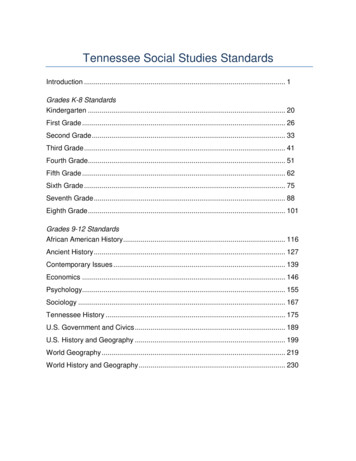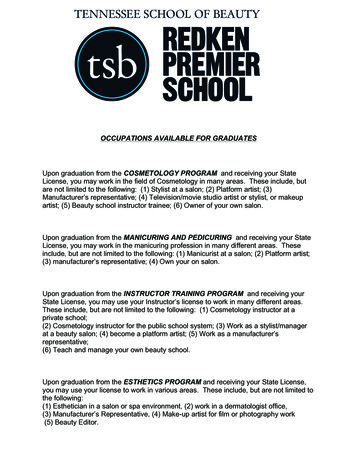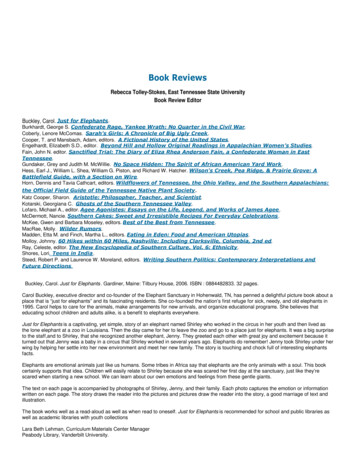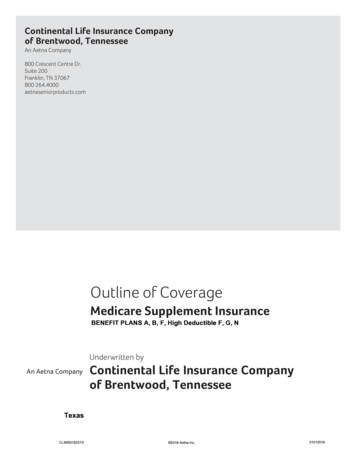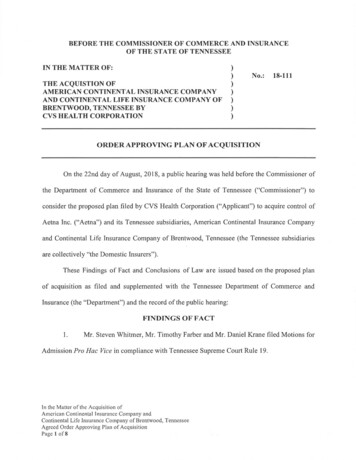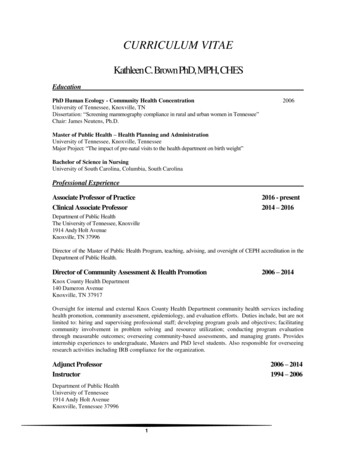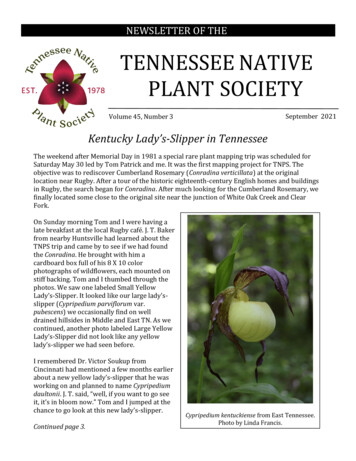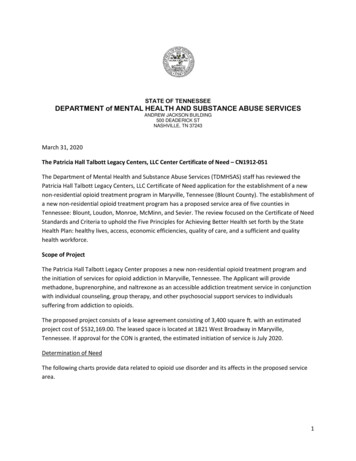
Transcription
STATE OF TENNESSEEDEPARTMENT of MENTAL HEALTH AND SUBSTANCE ABUSE SERVICESANDREW JACKSON BUILDING500 DEADERICK STNASHVILLE, TN 37243March 31, 2020The Patricia Hall Talbott Legacy Centers, LLC Center Certificate of Need – CN1912-051The Department of Mental Health and Substance Abuse Services (TDMHSAS) staff has reviewed thePatricia Hall Talbott Legacy Centers, LLC Certificate of Need application for the establishment of a newnon-residential opioid treatment program in Maryville, Tennessee (Blount County). The establishment ofa new non-residential opioid treatment program has a proposed service area of five counties inTennessee: Blount, Loudon, Monroe, McMinn, and Sevier. The review focused on the Certificate of NeedStandards and Criteria to uphold the Five Principles for Achieving Better Health set forth by the StateHealth Plan: healthy lives, access, economic efficiencies, quality of care, and a sufficient and qualityhealth workforce.Scope of ProjectThe Patricia Hall Talbott Legacy Center proposes a new non-residential opioid treatment program andthe initiation of services for opioid addiction in Maryville, Tennessee. The Applicant will providemethadone, buprenorphine, and naltrexone as an accessible addiction treatment service in conjunctionwith individual counseling, group therapy, and other psychosocial support services to individualssuffering from addiction to opioids.The proposed project consists of a lease agreement consisting of 3,400 square ft. with an estimatedproject cost of 532,169.00. The leased space is located at 1821 West Broadway in Maryville,Tennessee. If approval for the CON is granted, the estimated initiation of service is July 2020.Determination of NeedThe following charts provide data related to opioid use disorder and its affects in the proposed servicearea.1
Opioid Use Disorder in Proposed Service pulation of Opioid18 Yearsandof esPer DeathsFY 18HeroinOverdoseDeathsFY .01-90.54338727Source: TDMHSAS Fast Facts, TDOH, NSUD, 2018 Tennessee Drug Overdose DeathsProjections of Utilizations/ OccupancyThe applicant projects it will treat 240 individuals in Year 1 and 480 individuals in Year 2 based onprevious experience in operating comparable facilities. Clinical determination of treatment for opioiduse disorder is based on the clinical judgement of providers evaluating the patient. Estimating thenumber of patients requiring treatment with methadone does not have a quantitative number as theuse of methadone as a treatment option may be patient preference. Having multiple treatment optionsare necessary to combat the epidemic of opioid addiction.Estimated Patients Year 1 and Year 2Patients Year Patients Year 238030302020480Unique Number of Patients Receiving Care in OTPUnique Patients Treated as of7/22/2019 in OTPCountyUnique PatientsBlount155McMinn38Loudon562
MonroeSevierTOTAL30133412Source: TDMHSASPayor MixThe Applicant’s projected payer mix for Year 1 consists of 85.5% self-pay, 9.5% commercial/othermanaged care, and 5% charity care. In the proposed service area of Blount, McMinn, Monroe, Loudon,and Sevier Counties it is estimated that 4.41% of the service population lives in poverty and 18.90% ofservice area residents are enrolled in TennCare. The Applicant states it plans to contract with Medicareand TennCare once the two payers cover OTP services.Applicant’s Projected Payer Mix, Year 1Payer SourceMedicare/Medicare Managed CareTennCare/MedicaidCommercial/Other Managed CareSelf-PayCharity CareOtherTotalProjected Gross OperatingRevenueN/AN/A 64,318 579,000.20 33,721.00N/A 677,040.00As a % of totalN/AN/A9.5%85.5%5%N/A100%Charity CareCharity care patients include patients experiencing financial hardships as well as pregnant patients whoare unable to pay for services. The Applicant expects to provide approximately five percent of its grossrevenue as charity care. This equates to twelve patients receiving care at no cost in the first year ofoperations and twenty-four patients in the second year.Gross RevenueYear 1Year 2 677,040.00 1,926,960.00Gross Charge PerPatient 2,821.00 4,014.50Charity Care Total 33,721.20 96,348.00Total Charity CarePatients1224Special PopulationsThe Patricia Hall Talbott Legacy Center will provide care to individuals who are pregnant, HIV positive, orhave hepatitis. The Applicant states it will collaborate with the criminal justice system to providecontinuous treatment in the event of incarceration and will accept referrals from local drug courts.Licensure and Quality Considerations3
If the CON is approved, the Applicant will seek licensure by the Tennessee Department of Mental Healthand Substance Abuse Services (TDMHSAS) and accreditation by The Joint Commission.The application states that Zachary Talbott, who is a managing member and has 31% ownershipinterests, has provided operational, policy, compliance, and clinical consulting for office based opioidtreatment providers and opioid treatment programs. The application further states that Mr. Talbott isproficient in the behavioral health accreditation standards of The Joint Commission and CARFInternational.AnalysisService AreaThe project’s primary service area includes the following counties: Blount, McMinn, Monroe, Loudon,and Sevier.Outstanding CONs Impacting Supply in Service AreaThe project proposal is to initiate a new health service for Blount County by establishing a nonresidential opioid treatment program that will provide methadone as an alternative treatment for opioiduse disorder. CN1807-034 for New Hope Treatment Center was approved on December 12, 2018 for anon-residential opioid treatment program in Cocke County, TN. At the time of the review, the New HopeTreatment Center had not opened. It should be noted that both the Applicant and New Hope TreatmentCenter have both identified Sevier County in their proposed service area when calculating need.Recent OTP ApprovalsCN1807-034Non-Residential OpioidTreatment FacilityNew Hope Treatment CenterApproval DateDecember 12, 2018Counties ServedCocke, Grainger, Greene,Hamblen, Hawkins,Jefferson, and SevierEconomic FeasibilityOwnership and ManagementThe Applicant is a Tennessee limited liability company (LLC) with the following managing members andownership interests: Zachary Charles Talbott (31%); Leslie Talbott Tummel (23%); Alan Joseph Fuller(23%); and Joshua Grant Tummel (23%).The Applicant anticipates a positive free cash flow of roughly 44,578.00 in Year 1 and a positive freecash flow of roughly 824,082.00 by the end of Year 2. Funding shall be provided by the members of theLLC out of their personal assets and cash reserves.Access4
The proposed non-residential opioid treatment program will allow access of methadone,buprenorphine, and naltrexone as available treatment options in the proposed service area. Theapplication notes that public transportation services are offered by East Tennessee Human ResourceAgency for individuals in Blount, McMinn, Monroe, Loudon, and Sevier Counties.Distance in Miles and Drive TimeCountyBlountLoudonMcMinnMonroeSevierThe Patricia Hall Talbott Legacy Center1821 West BroadwayMaryville, TNPrincipal CityMilesMaryville2.4 milesLoudon26.6 milesAthens41.8 milesMadisonville25.5 milesSevierville29.1 milesDrive Time in Minutes5 minutes35 minutes53 minutes30 minutes41 minutesSource: Google Maps 3/30/2020Comparison to Closest roeSevier2.4/526.6/3541.8/5325.5/3029.1/41New iles/Minutes 257/6156/6029.4/3429.3/33Source: Bing Maps 2020Proposed business days and hours of operation are Monday through Friday from 6:00 a.m. to 12:00 p.m.and on Saturday and Sunday from 6 a.m. until 9 a.m.Contribution to the Orderly Development of Health CarePhysical PlantThe project consists of a lease agreement of a structure with 3,400 square ft. The specifications andrequirements for a non-residential opioid treatment program are consistent with licensure andaccreditation standards.Contribution to the Orderly Development of HealthcareStaffing/Recruitment/Salaries5
The proposed staffing pattern for the non-residential opioid treatment program appears to be adequatewith listed salaries for position classifications being within local hiring practices. The application states ithas surveyed the workforce availability in Blount County and feels confident that adequate staff can behired.Effects on Existing Providers and ResourcesThe Applicant states it will establish working relationship with all hospitals and emergency rooms in theservice area, including but not limited to Blount Memorial Hospital in Maryville, Fort Loudon MedicalCenter, Sweetwater Hospital Association, LeConte Medical Center, and Starr Medical Center.Positive EffectsThe establishment of a non-residential opioid treatment program would include having an alternativetreatment option available in the proposed service area and in certain circumstances, decrease bothtravel time and distance traveled.Negative EffectThe approval of the application could reduce the census of existing and the recently approved, butunimplemented, non-residential opioid treatment programs.AlternativesThe Applicant states it did not consider any alternatives other than creating a new non-residential opioidtreatment program.Letters of Support/OppositionNumerous letters of support were received on behalf of the non-residential opioid treatment programwhich included local service providers, government officials, and faith-based organizations. No letters ofopposition to the project were received.Working Relationship with Existing Providers/Community LinkageThe Applicant states it will participate in community initiatives to help prevent substance use disordersand will collaborate with other healthcare, mental health, and social service agencies to access out-ofprogram service for individuals.The Applicant further states it intends to develop additional on-site outpatient programs such as anIntensive Outpatient Program and therapies for co-occurring mental health disorders once the nonresidential opioid treatment program has stabilized.Participation in Training of StudentsIf the CON is approved, the Applicant states it will partner in the provision of education to studentsthrough internships and field placement experiences.6
Conclusions1. Need for available treatment options for opioid use disorder is identified. Numerous letters ofsupport were received and as of the review date, no letters of opposition.2. The proposed project is economically feasible and provides documentation of availability ofneeded capital for start-up.3. The proposed non-residential opioid treatment program will seek licensure by the TennesseeDepartment of Mental Health and Substance Abuse Services and accreditation by The JointCommission. The proposed organizational structure, physical plant, and service delivery modelare consistent with current standards.4. The proposed non-residential opioid treatment program will partner in the provision ofeducation to students through internships ad field placement experiences. The Applicant doesnot identify any barriers in the ability to hire qualified staff.Laura Young, Chief Nursing OfficerTN Department of Mental Health and Substance Abuse ServicesAndrew Jackson Building, 6th Floor500 Deaderick StreetNashville, Tennessee 372437
Center, Sweetwater Hospital Association, LeConte Medical Center, and Starr Medical Center. Positive Effects The establishment of a non-residential opioid treatment program would include having an alternative treatment option available in the proposed service area and in certain circumstances, decrease both travel time and distance traveled.

